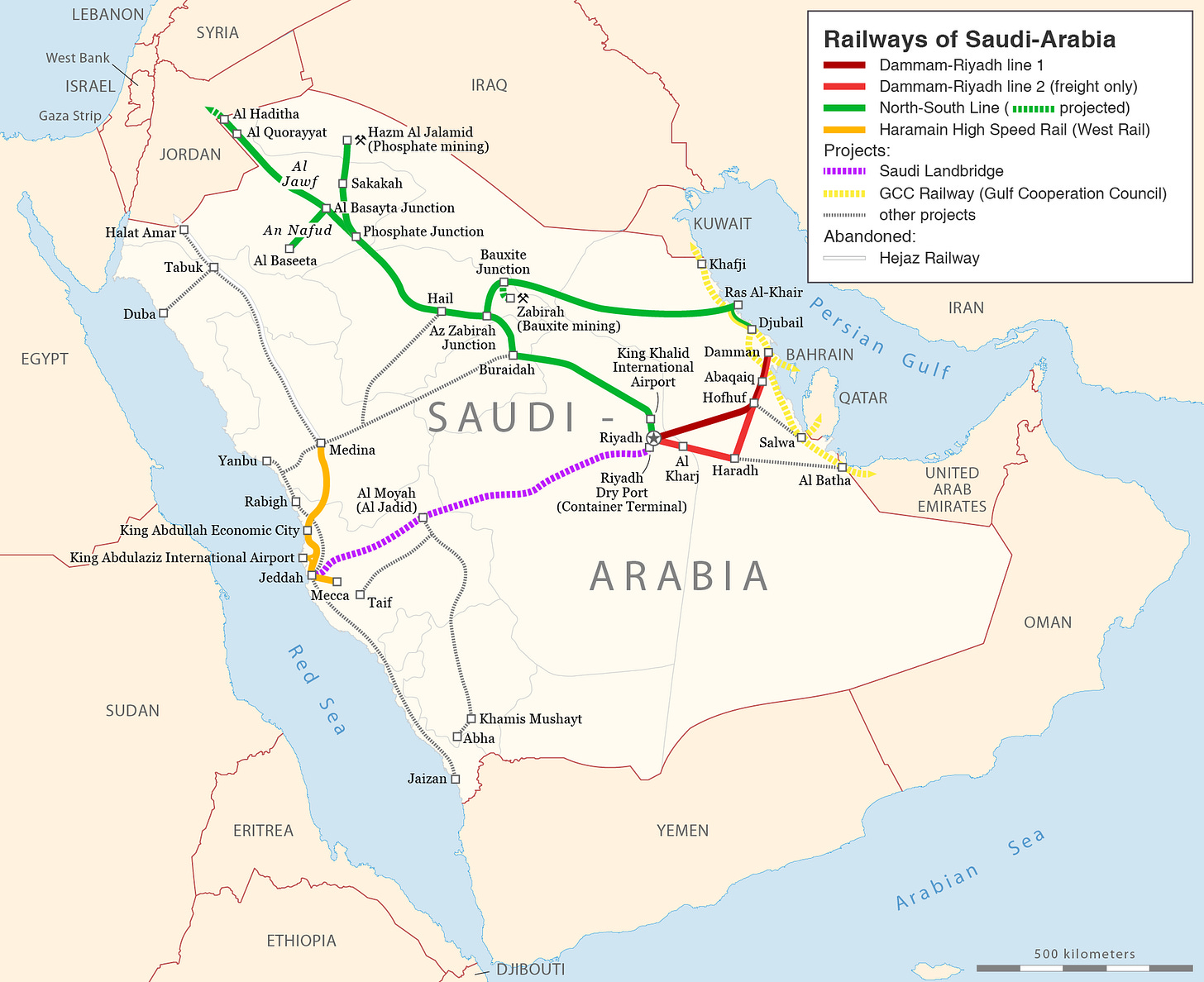From Vision to Reality: Saudi and UAE Strategic Play with the IMEC Railway
The IMEC highlights the growing role of infrastructure in the geopolitics of MENA, where railways and ports serve as critical economic and political power brokers.
At the G20 Summit in New Delhi, the India-Middle East-Europe Economic Corridor (IMEC) was announced in September 2023. The project aims to reshape trade routes, linking India, the Gulf, and Europe through a complex system of railways, ports, pipelines, and digital infrastructure. The IMEC reflects a broader vision by Israel, Saudi Arabia, and the UAE to position themselves as indispensable global trade hubs.
A New Trade Path Through the Middle East
The IMEC corridor will feature two main sections: a maritime eastern corridor, connecting India with the Gulf, and a northern corridor, which consists of an overland railway linking the Gulf to Israel, as well as a maritime shipping route connecting Israel to Europe. This design provides an alternative trade route compared to traditional ones like the Suez Canal. To facilitate free trade across the corridors, the UAE has recently signed free trade agreements with India, Israel, and Jordan.
The Gulf is already witnessing a boom in intra-GCC railway expansion to support the IMEC. Additionally, the UAE and Jordan have agreed that Etihad Rail, the UAE’s national railway development and operation firm, will design, construct, and manage a new railway line in Jordan. This line will span approximately 360 km, connecting key mining areas with the Port of Aqaba, serving to facilitate trade between the GCC and Jordan in the context of the IMEC.
Egypt's Joins the IMEC Railway Network
Disruptions to the Suez Canal due to Houthi attacks and the Israel-Gaza conflict have driven Egypt to rethink its economic reliance on the Canal, as revenues have dropped by over 60% in recent months. To diversify its revenue streams, Egypt is accelerating infrastructure development in Sinai to foster new trade opportunities and promote greater regional integration. This includes resuming railway services in Sinai after a 50-year hiatus.
The operation of this line will help facilitate the movement of people and goods from Sinai to other Egyptian governorates and El-Arish port. Furthermore, the reopening of the railway line aims to establish new urban communities and industrial zones, support economic development projects in North Sinai, reduce transportation costs for goods and people, and enhance tourism in the region.
According to plans released by the Israeli prime minister's office, the train line connects to the Gaza-Arish-Sderot Free Trade Zone, envisioned as part of the Gaza 2035 plan to integrate Gaza and Egypt into the IMEC through industrial and transportation investments.
Gaza’s Future and Regional Integration
The Gaza 2035 Plan plays a pivotal role in the IMEC framework, envisioning Gaza as a future industrial and logistical hub under the Arab Coalition-led Gaza Rehabilitation Authority (GRA). It proposes a free trade zone that spans Gaza, Sderot, and El-Arish (North Sinai), offering new trade routes for Saudi oil, gas, and mineral exports. The plan transforms Gaza into a manufacturing hub for electric vehicles, among other sectors, aiming to reduce China's influence in Gaza's reconstruction efforts. The combination of new trade corridors, railways, and industrial zones signals a strategic shift towards finding a long-term solution for Gaza through regional integration, rather than short-term relief efforts previously attempted.
Railways and Ports as the New Power Brokers in the Middle East
The IMEC highlights the growing role of infrastructure in the geopolitics of MENA, where railways and ports serve as critical economic and political power brokers. For Saudi Arabia and the UAE, the IMEC is part of a long-term strategy to establish themselves as central players in global trade by positioning their countries as indispensable trade hubs. For Egypt, the integration of Sinai’s infrastructure in the IMEC is a way to diversify its economy and reduce its dependence on the Suez Canal revenues. For Israel, the IMEC aims to secure its long-term security by strategically embedding itself in regional and global supply chains.
Recent developments suggest that Hamas and its allies have failed to completely disrupt the IMEC, merely delaying and briefly interrupting it. In a recent speech, Iran's Supreme Leader acknowledged these plans and vowed to seek to disrupt them. This indicates that the conflict over Gaza is likely to escalate regionally, not just over Gaza itself but as part of a broader attempt to alter the regional security and economic architecture proposed by the US through the IMEC, in coordination with BRICS nations that have an interest in disrupting it.






